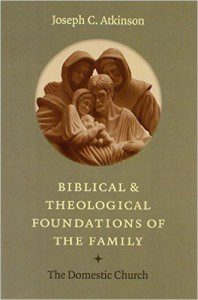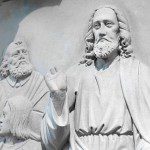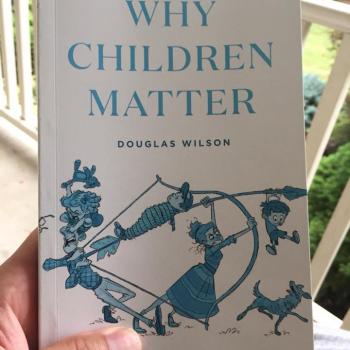I have long suspected that the real reason American evangelicals are so ignorant about the Old Testament is because it doesn’t support the individualistic and private religion they prefer.
Often when you hear someone say something like this you may safely assume that an advocate of the welfare state is about to use evangelicals as a foil for increasing the soft-totalitarianism progressives prefer. If that’s your fear, not to worry. For me Sweden is hell on earth (like Dante’s lowest level in the Inferno where Satan is encased in ice).
No, what I have in mind is much more intuitive and much older.
What we have in the Old Testament is centered on the family, not the welfare state. And there it is family connections that matter most. The individual is born into a family and the duties that attend to family life are what is stressed.
But there is something of a paradox at work here according to Joseph C. Atkinson, author of Biblical and Theological Foundations of the Family, because to the premodern way of looking at things an individual can be large enough so as to include other people.
This is what he refers to as The Corporate Personality.
The Corporate Personality in the Bible

References to it are all over the place, but we miss their significance because we tend to understand everything we read through a set of modern lenses. (Putting it another way, we misunderstand what we read.)
Throughout the Old Testament we hear the people of God referred to as Israel time and again. And in the New Testament people are said to be in Adam or in Christ. In the case of the Old Testament we think of Israel as the name of a nation, like United States. But recall, Israel is the name of a person. (Nobody named United States has ever lived.)
Israel is Jacob, Esau’s brother, and he’s Isaac’s son. He was given the name Israel by the Lord to to confirm that he was the true heir of the covenant God had made with Abraham.
When it comes to the New Testament’s use of the preposition in we think of its use as either a figure of speech or as a concept without any physical reality. For example, when it comes to leaving Adam and entering Christ it is as though we merely move from one side of a ledger in God’s mind to another.
But these ways of thinking–seeing Israel as a nation and not a person, and seeing Adam and Christ as concepts and not people–miss the truth. They miss corporate personalities. People can be big–very, very big–and we can fit inside them.
Here’s another way of looking at what I’m talking about.
In the modern world people can unite and create a legal person. They can even draw thousands of people into it. We call this forming a corporation. (From corpus–Latin for body.) This is the process people generally have in mind when they speak about forming a church–you know, discrete individuals voluntary coming together to form a body. But to premodern people you actually start with a person, with a real body, and over generations that person can grow to include thousands, even millions of people. This is what happened with Israel, and it is also the case with Adam, and yes, even Christ.
Here’s Atkinson on how it works:
…there appears to be active in Hebrew thought a construct which is foundational to and permeates the Israelite understanding of family. Like many underlying factors, it is not obvious and, perhaps because it is not obvious, it is all the more powerful. In any consideration of the OT understanding of family, the sense of an “organic” dimension begins to emerge. There is a vital organic link between the generations; the common ancestor-father provides the very identity for the later generations of the tribe…. The family is conceived as an organic entity; both blessings and curses are visited on the whole family because of the father’s actions. (p.162)
This is what it means to be an Israelite–you enjoy the blessings of the covenant because Israel was the true heir and you are in him. (This, by the way, is what it means to be in Adam as well, suffering the consequences of original sin. And it follows that this is what it also means to be in Christ, enjoying the blessings of his righteousness.)
This has at least two very important implications for families today.
First, in the New Testament it is assumed that families still function in this way. (And now you know why the household codes are not merely the residue of first century culture that can be easily sloughed off.)
And second, it is through fathers principally, and mothers in a pinch, that the blessings of the covenant are passed on to family members to this very day.
Next Thursday I’ll present what this means for fathers when I discuss priestly fatherhood as it is described in Atkinson.













